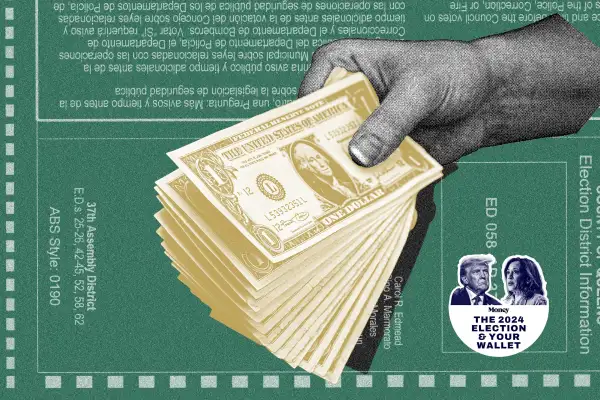4 Things to Do With Your Money Before the Election

Got election anxiety? You're not alone: A recent survey from the American Psychological Association found that 69% of adults see the U.S. presidential election as a significant source of stress.
Economic uncertainty is no joke, but it is something you can mitigate. Regardless of which candidate you're rooting for, here are a handful of things you can do before Nov. 5 to make sure you're in a good financial position and give you peace of mind.
Leave your portfolio alone
Dan Sudit, partner at Crewe Advisors, says the first thing to do is… chill out.
"Especially if you're young, I don't think you should really be relying on any particular geopolitical event to make [financial decisions] because we don't know what the outcome will be or what it will result in as it relates to investments," he says.
In such a divisive political environment, it's understandable for investors to think that a particular political outcome will lead to a specific market outcome, but when it comes to immediate economic implications, "that's not necessarily the case," he adds.
Indeed, according to Fidelity, presidential elections are simply not the market-moving events many people assume they are. A historical review shows that markets tend to be nonpartisan: Under various combinations of Democratic and Republican presidents and congressional majorities, the average annual S&P 500 performance has been positive going back to 1933.
Emotional, knee-jerk reactions are never advisable in investing, but that especially applies to elections, Sudit says. Rather than politics, your investment decisions should be rooted in the basics.
"If they're [investing] long-term dollars, they should be focusing on the long term," he adds. "Because this will happen, believe it or not, every four years."
Stop overreacting to the news
Sudit says the president has less control over your personal finances than you may think. Congress, not the White House, controls the purse strings, and independent agencies like the Federal Reserve — which just implemented the first of what's expected to be a series of interest rate cuts to lower the cost of borrowing — are not supposed to be politicized.
Flashy headlines should be taken with a grain of salt, Sudit says, because "there is no guarantee" that any political event is going to have the ripple effect people tend to expect.
As an example, he points to the surge in gun sales ahead of the 2016 election, which goosed the stock prices of companies that made and sold guns. Democratic candidate Hillary Clinton was widely expected to win, giving gun enthusiasts anxiety about whether they would still be able to buy firearms. When Republican Donald Trump was elected instead, that worry — and the spike in demand it triggered — almost immediately evaporated. Share prices for gun manufacturers like American Outdoor Brands and Sturm, Ruger & Co. fell sharply.
The lesson? "What seems like a logical outcome is not always the case," Sudit says.
If you're really searching for tea leaves to read, skip the sensational headlines and look at objective economic indicators like unemployment data, inflation levels and shifts in interest rates to guide your money moves.
Think about upcoming purchases
The New York Times published a story earlier this month about how "consumers tend to get skittish about major purchases like houses, cars, weddings and investments" right before elections due to the overall climate of uncertainty these political events create.
So if you're in self-reflection mode, rest assured that you're not alone, because it's not a bad idea to evaluate your timeline for any big-ticket buys.
Say you're considering buying an electric vehicle, or EV. Former President Donald Trump has suggested he would end the $7,500 EV tax credit that the Biden administration passed. Since the credit can be applied like an instant rebate at the point of sale, this means purchasing a new EV could essentially cost you $7,500 more if Trump were to win.
A similar phenomenon is happening in the housing market. Redfin reported recently that 23% of folks who hope to buy their first home in the next year are waiting to take the plunge until after the election. Specifically, they're delaying because they hope to take advantage of Vice President Kamala Harris' promise of $25,000 in down payment assistance.
Although there's no guarantee any candidate's campaign pledges will come to fruition, you could potentially save money on these big purchases if you timed them carefully.
Revisit the fundamentals
Sudit says one way to combat anxiety about the election results is to make sure your own financial house is in order by maintaining a budget buffer.
If you can shore up your emergency fund — which should ideally include three to six months' worth of everyday expenses in an easy-to-access account with an rate of return that at least keeps pace with inflation — you'll feel a lot better amid economy uncertainty.
Generally, though, you should try to remember that any election doesn't exist in a vacuum. It's hard even for experts to predict the economic outcome of future events so it's best to focus on the financial circumstances you can control — your own.
More from Money:
Will Inflation Be Worse Under Trump or Harris? Here's What Economists Say
The 9 Money Issues Voters Care Most About This Election, Ranked
This Stock Market Stat Has Predicted 83% of Presidential Elections in the Past Century

